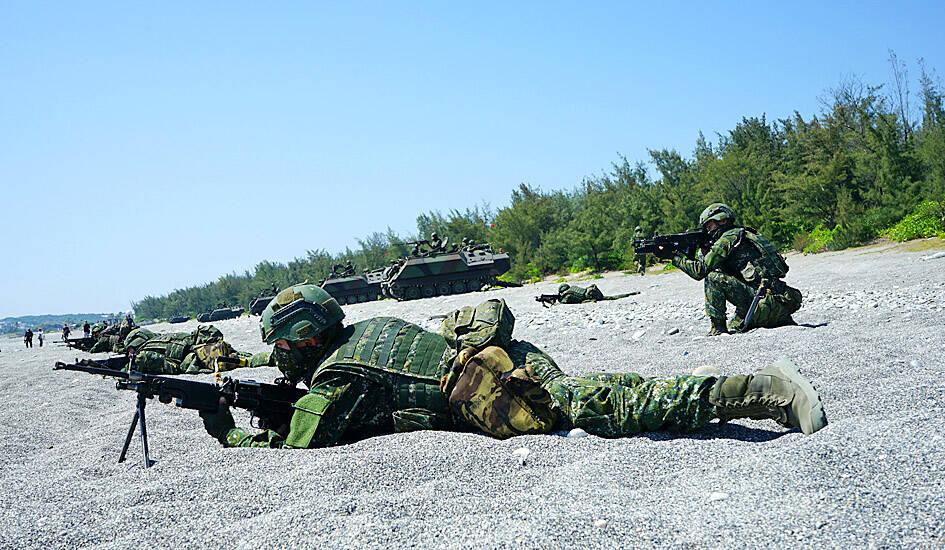The Ministry of National Defense’s proposed amendments to the General Mobilization Act (全民防衛動員準備法) have raised concerns over whether the changes would affect personal liberties.
The act was promulgated on Nov. 14, 2001, and was amended in 2014 and 2019.
The ministry yesterday said the law is focused too much on preparatory measures and lacks regulations defining a chain of command, a legal basis for expropriation during times of war and other issues.

Photo: CNA
The efficacy of the nation’s mobilization efforts is vital to its survival, the ministry said.
Article 13 of the act stipulates that all units in charge of mobilization readiness should ensure that personnel, equipment and facilities are prepared through inspections, inventory management and planning, to ensure the nation can defend itself in the event of an invasion.
A declaration of mobilization shows that a country is entering a time of alert, and necessary measures must be implemented, the ministry said.
The proposed amendments would protect the nation and ensure that Taiwanese can survive an attack, the ministry said, adding that it would consider all opinions before tendering another version for review.
It said it welcomes public input on the amendments, and called for calm and level-minded debates on the issue.
The ministry meanwhile denied a media report that the proposed amendment sought to use child labor to manufacture arms.
A section of the bill states: “School defense groups should assist with the production of military supplies.”
The ministry said the sentence does not mean that students would help manufacture ammunition.
The Chinese-language United Daily News yesterday reported that the Ministry of Education had asked local education offices nationwide to prepare lists of students aged 16 or above for mobilization purposes.
The newspaper said the list would be uploaded to the All-out Mobilization Defense Agency Web site and that the pupils would be used to manufacture munitions.
The ministry said creating such lists was regular practice, adding that the information would be uploaded to the Internet for ease of administrative management.
By law, school defense groups are not responsible for the wartime production of ammunition at military plants, the ministry said, adding that the groups would help manufacture 10 types of products, including food.
Additional reporting by CNA

The High Prosecutors’ Office yesterday withdrew an appeal against the acquittal of a former bank manager 22 years after his death, marking Taiwan’s first instance of prosecutors rendering posthumous justice to a wrongfully convicted defendant. Chu Ching-en (諸慶恩) — formerly a manager at the Taipei branch of BNP Paribas — was in 1999 accused by Weng Mao-chung (翁茂鍾), then-president of Chia Her Industrial Co, of forging a request for a fixed deposit of US$10 million by I-Hwa Industrial Co, a subsidiary of Chia Her, which was used as collateral. Chu was ruled not guilty in the first trial, but was found guilty

DEADLOCK: As the commission is unable to forum a quorum to review license renewal applications, the channel operators are not at fault and can air past their license date The National Communications Commission (NCC) yesterday said that the Public Television Service (PTS) and 36 other television and radio broadcasters could continue airing, despite the commission’s inability to meet a quorum to review their license renewal applications. The licenses of PTS and the other channels are set to expire between this month and June. The National Communications Commission Organization Act (國家通訊傳播委員會組織法) stipulates that the commission must meet the mandated quorum of four to hold a valid meeting. The seven-member commission currently has only three commissioners. “We have informed the channel operators of the progress we have made in reviewing their license renewal applications, and

Taiwan People’s Party (TPP) Chairman Huang Kuo-chang (黃國昌) yesterday appealed to the authorities to release former Taipei mayor Ko Wen-je (柯文哲) from pretrial detention amid conflicting reports about his health. The TPP at a news conference on Thursday said that Ko should be released to a hospital for treatment, adding that he has blood in his urine and had spells of pain and nausea followed by vomiting over the past three months. Hsieh Yen-yau (謝炎堯), a retired professor of internal medicine and Ko’s former teacher, said that Ko’s symptoms aligned with gallstones, kidney inflammation and potentially dangerous heart conditions. Ko, charged with

Taiwan-based publisher Li Yanhe (李延賀) has been sentenced to three years in prison, fined 50,000 yuan (US$6,890) in personal assets and deprived political rights for one year for “inciting secession” in China, China's Taiwan Affairs Office spokesman Chen Binhua (陳斌華) said today. The Shanghai First Intermediate People’s Court announced the verdict on Feb. 17, Chen said. The trial was conducted lawfully, and in an open and fair manner, he said, adding that the verdict has since come into legal effect. The defendant reportedly admitted guilt and would appeal within the statutory appeal period, he said, adding that the defendant and his family have